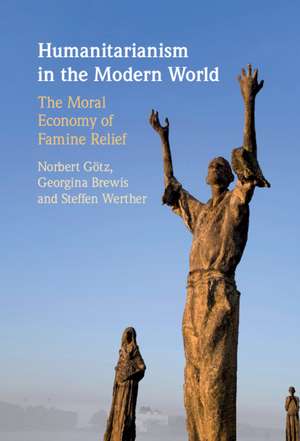Humanitarianism in the Modern World: The Moral Economy of Famine Relief
Autor Norbert Götz, Georgina Brewis, Steffen Wertheren Limba Engleză Hardback – 22 iul 2020
| Toate formatele și edițiile | Preț | Express |
|---|---|---|
| Paperback (1) | 209.07 lei 6-8 săpt. | |
| Cambridge University Press – 2 noi 2022 | 209.07 lei 6-8 săpt. | |
| Hardback (1) | 604.63 lei 6-8 săpt. | |
| Cambridge University Press – 22 iul 2020 | 604.63 lei 6-8 săpt. |
Preț: 604.63 lei
Preț vechi: 679.36 lei
-11% Nou
Puncte Express: 907
Preț estimativ în valută:
115.70€ • 121.35$ • 96.31£
115.70€ • 121.35$ • 96.31£
Carte tipărită la comandă
Livrare economică 01-15 aprilie
Preluare comenzi: 021 569.72.76
Specificații
ISBN-13: 9781108493529
ISBN-10: 1108493521
Pagini: 320
Dimensiuni: 159 x 235 x 25 mm
Greutate: 0.66 kg
Editura: Cambridge University Press
Colecția Cambridge University Press
Locul publicării:Cambridge, United Kingdom
ISBN-10: 1108493521
Pagini: 320
Dimensiuni: 159 x 235 x 25 mm
Greutate: 0.66 kg
Editura: Cambridge University Press
Colecția Cambridge University Press
Locul publicării:Cambridge, United Kingdom
Cuprins
List of Tables; List of Figures; Acknowledgements; List of Abbreviations; Introduction; 1. Famine Relief in Perspective; 1.1 Social Origins of Famine; 1.2 The Moral Economy of Aid; 2. Case Studies; 2.1 Three Ages of Humanitarianism; 2.2 The Great Irish Famine and Ad Hoc Humanitarianism; 2.3 The Russian Famine of 1921–3 and Organised Humanitarianism; 2.4 Famine in Ethiopia 1984–6 and Expressive Humanitarianism; 3. Appeals; 3.1 The Humanitarian Appeal; 3.2 Empire, Faith, and Kinship – Ireland; 3.3 Altruism, Self-Interest, and Solidarity – Soviet Russia; 3.4 Television, Shame, and Global Humanity – Ethiopia; 3.5 Arousing Compassion: A Long View on Calls for Famine Relief; 4. Allocation; 4.1 Allocating Gifts; 4.2 Fostering Local Efforts – Ireland; 4.3 Live and Let Die – Soviet Russia; 4.4 Relief, Rehabilitation, and Resettlement – Ethiopia; 4.5 Targeting Aid: Realities on the Ground across Two Centuries; 5. Accounting; 5.1 Humanitarian Accountability; 5.2 Figures, Narratives, and Omissions – Ireland; 5.3 The Power of Numbers – Soviet Russia; 5.4 More than 'Dollars' and 'Per Cent' – Ethiopia; 5.5 Keeping the Record: A Bicentennial Perspective; Conclusion: The Moral Economy of Humanitarianism; List of References; Index.
Recenzii
'This thoughtful history of humanitarianism links three case studies, all involving original research, to an analytical-historical framework for understanding famine relief, whereby the ad hoc efforts of the nineteenth century gave way in turn to more bureaucratized relief (c. 1900-1970) and the more aggressive, media-driven humanitarianism of the present. Well-written and clever, it should attract a broad readership, including policy-makers and civil society activists.' Cormac Ó Gráda, author of Famine: A Short History and co-editor of Famine in European History
'This book is an exciting departure in the history of humanitarianism. Its main innovation is in the authors' use of moral economy to explore in detail the triage and prioritisation famine relief work entailed. Stimulating and rewarding in turn, this book challenges our perception of how the history of aid can be written.' Bertrand Taithe, co-author of The Charity Market and Humanitarianism in Britain, 1870-1912
'Anyone interested to learn more about aid appeals for humanitarian disasters will not be disappointed by this rich account created by Götz, Brewis and Werther. Covering three of the world's most impactful humanitarian disasters, the author's provide a wealth of information full of relevant learnings for scholars, but also philanthropy professionals working on aid appeals for current humanitarian disasters.' Pamala Wiepking, editor of The Palgrave Handbook of Global Philanthropy
'This very highly recommended book is an indispensable contribution to the growing study of historical change in humanitarian organizations.' J. M. Rich, Choice
'This book is an exciting departure in the history of humanitarianism. Its main innovation is in the authors' use of moral economy to explore in detail the triage and prioritisation famine relief work entailed. Stimulating and rewarding in turn, this book challenges our perception of how the history of aid can be written.' Bertrand Taithe, co-author of The Charity Market and Humanitarianism in Britain, 1870-1912
'Anyone interested to learn more about aid appeals for humanitarian disasters will not be disappointed by this rich account created by Götz, Brewis and Werther. Covering three of the world's most impactful humanitarian disasters, the author's provide a wealth of information full of relevant learnings for scholars, but also philanthropy professionals working on aid appeals for current humanitarian disasters.' Pamala Wiepking, editor of The Palgrave Handbook of Global Philanthropy
'This very highly recommended book is an indispensable contribution to the growing study of historical change in humanitarian organizations.' J. M. Rich, Choice
Notă biografică
Descriere
A fresh look at two centuries of humanitarian history through a moral economy approach focusing on appeals, allocation, and accounting.
